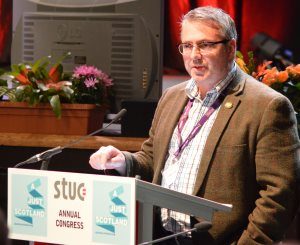
#STUC16 The STUC will press the Scottish Government to adequately fund the Scottish Fire and Rescue Service and to properly staff their control rooms, currently being cut from eight to three.
UNISON Police Staff’s George McIrvine spoke in support of the FBU motions and drew parallels with the move to a single police force in Scotland.
He pointed out that, like Police Scotland, the primary justification for the creation of a single Fire and Rescue Service was the drive for financial savings under the auspices of efficiency and the delivery of an alleged improved service. However the case was only built on an outline business case and not a ‘fully costed financial business case.’
Audit Scotland are already estimating a potential funding gap of £42.7 million in 2019/2 similar to the scenario which exists with the Scottish Police Authority where this year alone a black hole emerged of an estimated £27 million “with no real plan as how to recoup the deficit.”
Despite this, said George, the Board continues in its “ridiculous mindset” to carry out year on year efficiency savings till 2026 to achieve their unrealistic £1.1 billion of savings whilst still committing to the outdated uncosted soundbite manifesto pledge of keeping 1000 extra cops who have perversely replaced the near 2000 experienced loyal specialised civilian staff who have been made redundant over the last 3 years.
“It is unrealistic that a modern ‘Best Value’ Police and Fire Service can be founded and built with such poor strategic planning, cuts to budgets and on such demanding timelines,” slammed George.
“This is clearly unsustainable and adds mounting pressure to the dedicated staff.”
George also condemned the closures of the Scottish Fire and Rescue Service control rooms telling delegates, “We have lived and breathed the nightmare of control room mergers within Police Scotland over the past couple of years. We have had the arguments with the employer and supported and campaigned with our members through the consultations which have already witnessed closures in Dumfries, Glenrothes and Stirling with Aberdeen looking down the barrel of a gun at this time.
“Whilst we see Police Scotland adopting measures which are designed to mitigate the risks during transition, a great deal of uncertainty still surrounds whether the end state model is fit for purpose to deliver the equitable or improved service it promises to.”
George added that there are real concerns about a lack of local knowledge, refuted by both Police Scotland and the Scottish Fire and Rescue Service.
“Despite these attempts to ‘reassure’ there is evidence to suggest that the pursuit of centralisation is fraught with problems, which are simply being dismissed,” said George, citing the academic study ‘Local Expertise at an Emergency Call Centre’ (2005) which identifies at least four different and very broad kinds of knowledge that are visible in local centre work but not currently accessible in any available technology.
“The reality our members have faced is one of reduced staff and increased workload which has had a detrimental impact on employee health and wellbeing and also the quality of service to the public.
“This is not sustainable or progressive and places cost and not value before the safety and wellbeing of staff and the wider community in which they serve.”
